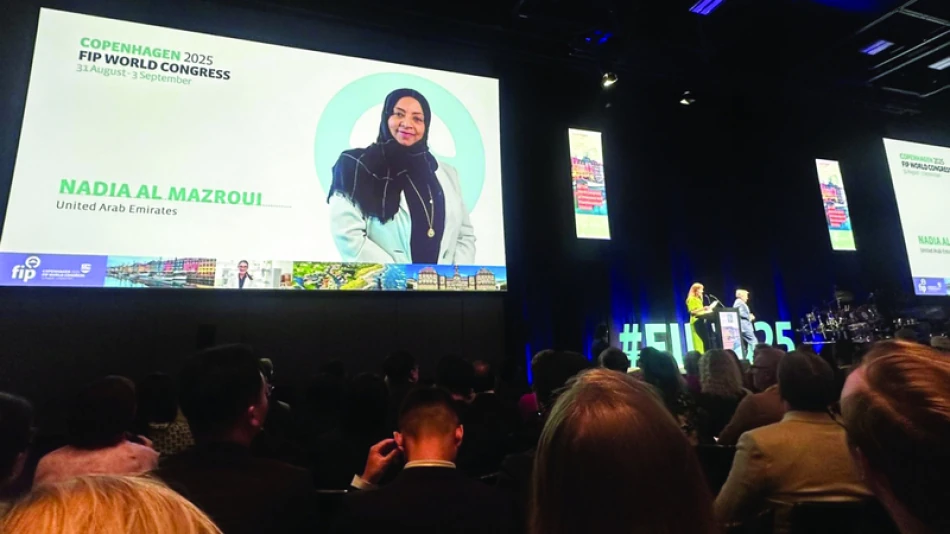
UAE's Nadia Al Marzouqi Elected Deputy President of International Pharmaceutical Federation
UAE Pharmaceutical Leader Breaks Glass Ceiling in Global Healthcare Governance
Dr. Nadia Rashid Al Mazrouei, an associate professor at the University of Sharjah's College of Pharmacy, has secured the vice-presidency of the International Pharmaceutical Federation (FIP) Board, marking a watershed moment for Arab women in global pharmaceutical leadership. Her election at the federation's annual meeting in Copenhagen represents more than individual achievement—it signals the growing influence of Gulf expertise in shaping international healthcare policy.
A Strategic Victory for Regional Influence
Al Mazrouei's triumph over competitors from pharmaceutical powerhouses including the United States and India demonstrates the UAE's rising soft power in global health governance. The decisive margin of victory, backed by strong support from Gulf and Arab pharmaceutical associations, reflects a coordinated regional strategy to amplify Middle Eastern voices in international healthcare decision-making.
"This victory is not personal, but a win for the UAE, the Gulf states, and the entire Arab world," Al Mazrouei stated, emphasizing the collective nature of her achievement. Her appointment as the first Gulf woman and second Arab woman to reach this position—following Dr. Samira Al Qasous—underscores the gradual but significant shift in global pharmaceutical leadership demographics.
Breaking Barriers in Male-Dominated Sector
Historical Context
The pharmaceutical industry has traditionally been dominated by Western institutions and male leadership. Al Mazrouei's election comes at a time when international organizations are increasingly recognizing the need for diverse perspectives, particularly from regions experiencing rapid healthcare transformation like the Gulf states.
Regional Implications
Her 35-year career spanning pharmaceutical education, health leadership, and international drug policy positions her uniquely to advocate for emerging market concerns. The UAE's significant investments in healthcare infrastructure and pharmaceutical manufacturing—including major facilities in Dubai and Abu Dhabi—provide concrete backing for her influence.
Innovation Leadership and Global Trends
Al Mazrouei's pioneering work in "Green Pharmacy" initiatives and pharmaceutical security projects aligns with global sustainability trends reshaping the industry. As pharmaceutical companies worldwide grapple with environmental concerns and supply chain vulnerabilities exposed during the COVID-19 pandemic, her expertise becomes increasingly relevant.
The timing of her election coincides with the FIP's strategic focus on expanding access to medicines in developing markets—an area where Gulf states have become significant players through humanitarian aid and pharmaceutical investments across Africa and Asia.
Strategic Advantages for Healthcare Policy
Market Perspective
From an industry standpoint, Al Mazrouei's appointment could facilitate greater integration between Western pharmaceutical companies and rapidly growing Middle Eastern markets. The UAE's position as a regional healthcare hub, combined with Saudi Arabia's Vision 2030 healthcare transformation, creates substantial opportunities for policy alignment.
Regulatory Harmonization
Her role may accelerate regulatory harmonization between Gulf Cooperation Council countries and international standards, potentially streamlining drug approval processes and enhancing regional pharmaceutical trade. This development could prove particularly valuable as the region seeks to reduce dependence on pharmaceutical imports.
Broader Implications for Arab Leadership
The enthusiastic congratulations from Kuwait's Pharmaceutical Society and other Arab associations highlight the symbolic importance of Al Mazrouei's achievement. Her success demonstrates that sustained investment in education and professional development—hallmarks of UAE policy—can yield tangible returns in international influence.
As global healthcare faces challenges from aging populations, antimicrobial resistance, and climate-related health impacts, diverse leadership becomes not just morally imperative but strategically essential. Al Mazrouei's appointment suggests that international pharmaceutical governance is evolving to reflect these realities, with potentially significant implications for how global health policies are formulated and implemented.
Most Viewed News

 Sara Khaled
Sara Khaled






